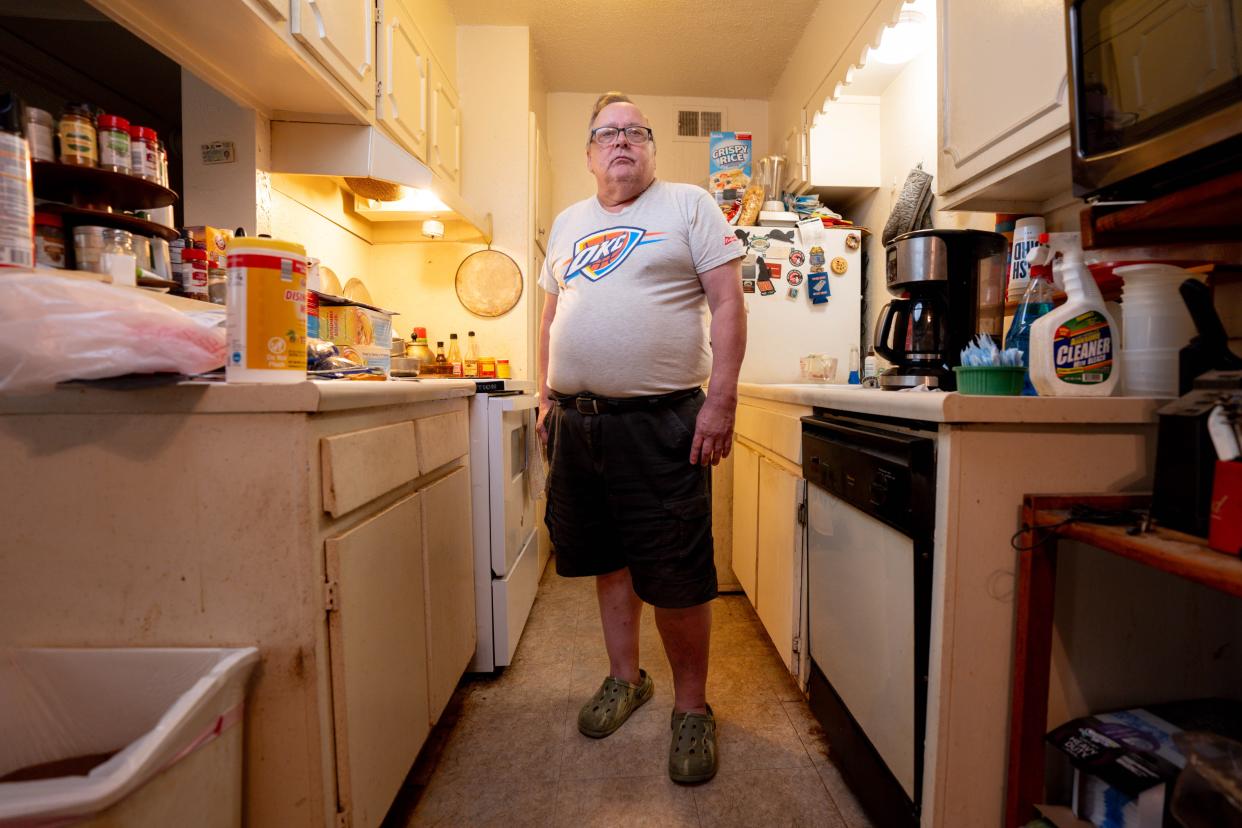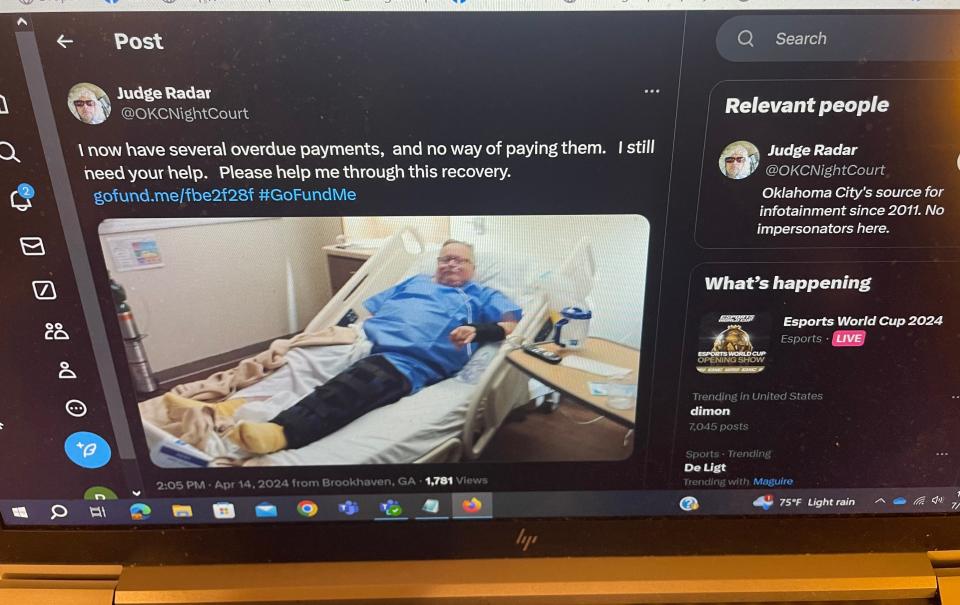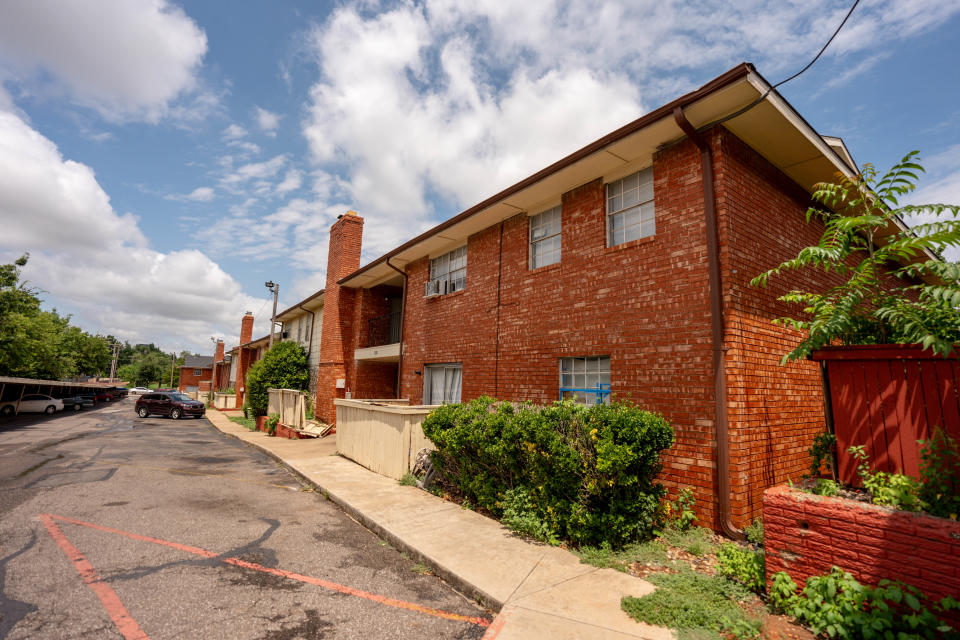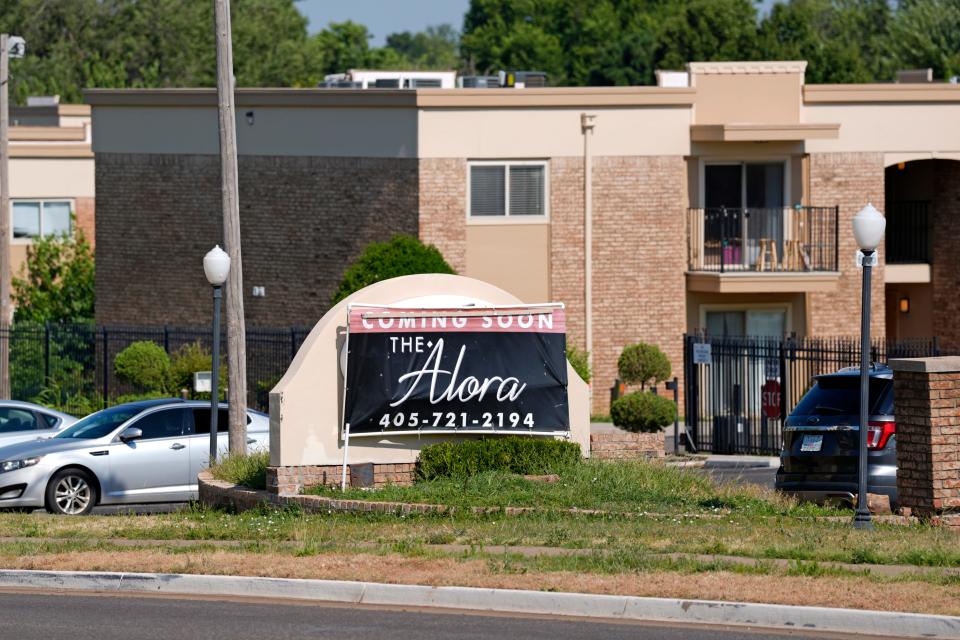How much would Biden's rent control plan help? What Oklahoma renters, landlords think

John Doyle's friends call him "Radar," but he didn't see the scooter wreck coming in April that threw him to the ground, sent hospital bills to the sky, had him desperately asking for help with a GoFundMe page, and almost got him evicted from his apartment for back rent, which was already headed up — again.
Doyle, 61, who lost his job as a DoorDash delivery driver because of the wreck, got lucky. Donations helped get him through the worst, and the income from a new job as a night auditor for Champion Hotels helped him work with his landlord to get the eviction case dismissed and a new one-year lease, with raised rent.
But the ordeal has left him, like a lot of Oklahoma City area renters, wondering if and how President Joe Biden's proposed cap on rent increases might ease the region's worsening affordability crisis. The plan, if approved by Congress, would cap annual rent increases at 5% for "corporate landlords" — those with 50 units or more. Those who don't comply would lose federal tax breaks based on property depreciation.
Landlord associations and industry groups have assailed the proposal. And with President Biden bowing out of his reelection run, it is unclear if the idea will gain any traction in Congress this year.
More: Evictions are on the rise in Oklahoma. Legal counsel may be made available to help
But housing advocates say rent increases, along with growing insurance costs and other inflationary pressures, have led to a surge in eviction filings in the years since the pandemic. According to a report by Shelterwell, a nonprofit group that works with tenants, landlords and community partners to create housing stability in Oklahoma, evictions filings shot up in 2022 to 18,813, after not exceeding 14,900 in the previous six years. They fell slightly last year to 17,868.
And while rents in Oklahoma City remain relatively affordable compared to many large cities, the city and state have few protections for renters. The online real estate company Redfin reported that at one point in 2022, in October, OKC saw the fastest rising rents year over year, 31.7%, among the country’s 50 largest cities.
Price Edwards & Co., which tracks complexes in Oklahoma City with 50 or more units, the kind that would be impacted by Biden's rent cap, reports that rents jumped 12% in 2021 and 6% in 2022. Apart from those two years, however, increases had averaged about 3.3% annually since 2016.

Oklahoma renters are at risk of drastic rent increases
Doyle calls Biden's plan a nice idea, "but how are you going to enforce it," he wondered.
Doyle has lived at Muntage Apartment Homes, 3041 NW 41, for 13 years. His rent increases have been modest. When he renewed his lease in April, his rent went from $705 to $735 per month, an increase of 4.3%. Last year, it went from $685 to $705 per month, or 2.9% more.
Still, he's worried. Doyle said he's heard of new leases for units his size at the 60-year-old Muntage Apartments recently soaring to nearly $1,000 monthly at renewal. Muntage, owned by Tulsa-based Vesta Capital, does offer units the size of Doyle's for considerably higher rent, but they've been renovated, according to the apartment complex's website.
Plus, he's concerned that rents at Residences at OAK, new upscale apartments near his at 5001 N Pennsylvania Ave., will raise the market rate for rent in the area, taking his up with it. A single-bed apartment at OAK, about the same size as his, 673 square feet, is available for $1,737 per month, no bills paid ― $1,002 more than Doyle pays.
The effect on rent control in Oklahoma from Biden's plan wouldn't be great because, except for the COVID-related increases, rents on average don't rise more than 5% per year, said Greg Beben, staff attorney for Legal Aid Services of Oklahoma.
More: Inflation and low wages put the squeeze on Oklahomans. Here's how some people are coping
Beben said federal regulations keep him from weighing in on the merits of proposed legislation, but in general, he said Oklahoma law gives few protections to renters, and nothing limits the amount a landlord can raise rents after a lease expires.
Landlords "can jack the rent up as high as they want," Beben said, and "evictions are fast, cheap and easy."
An annual rent cap isn't as simple a solution as it might sound, said Kelly Berger, president of the board of the nonprofit Oklahoma Coalition for Affordable Housing.
"In addressing rent increases, it's crucial to balance the need for affordable housing with the economic realities of rising payroll, taxes, utilities and property insurance costs," said Berger, who is director of family support for the homelessness nonprofit Positive Tomorrows. "Some properties are seeing 20% or more increases in property insurance.
"While we all champion accessible rents, implementing a cap requires careful consideration of these complexities. It's a nuanced issue demanding thoughtful solutions."

David Dirkschneider, an Oklahoma City apartment broker, owner and affordable housing proponent, finds himself torn by the idea, although firmly committed to letting housing markets work without such direct federal intervention.
Biden rent control plan would fail to protect renters, OKC apartment owner and broker says
Dirkschneider, a broker with Capstone Cos. since 2020, said his six years of service on the board of the nonprofit Mental Health Association Oklahoma, including his current chairmanship of its housing committee, helps him see the issue from multiple angles.
He said the association owns nearly 2,000 units "dedicated to preserving affordable housing and preventing homelessness," and that it is the largest Oklahoma recipient of funding from the U.S. Department of Housing and Urban Development.
"This is a topic that I'm deeply passionate about. The apartment owner side of me wants to raise rents as much as possible. The nonprofit side of me wants everyone to enjoy affordable housing," he said. "What I can tell you, regardless of my private or nonprofit perspective, is that limiting rent growth has the opposite effect from what they want. They don’t understand that this proposal fails to protect renters, which is their ultimate goal."
Capping rents would restrict development, he said.
"When you restrict development, you are taking units off the market that would have delivered inventory that would have naturally regulated rents. It’s a supply-and-demand issue," Dirkschneider said. "When there is more demand, and you can supply, prices increase. Alternatively, when you let the market regulate itself, like in Oklahoma City, the development community will build the amount of housing stock that the market can handle."
He said the OKC apartment market works.
"Rents will increase just enough to justify new housing while affording the developer a modest profit," Dirkschneider said. "There’s a reason the markets with the most rent regulations also have the worst affordability issues. They disincentivize investment into those rental markets, resulting in fewer available rental units.
"If the restrictions were removed in Los Angeles, San Francisco or New York, there would be a surge in housing development. When the inventory increases, there are more options. Again, supply and demand, the prices regulate themselves."
Rent control discourages property maintenance and improvement, OKC brokerage says

In addition to making housing more scarce, therefore more expensive, rent controls discourage landlords from keeping properties in good condition, said Jim Parrack, senior vice president at Price Edwards & Co.
"Artificial rent controls end up making multifamily a less attractive investment and give multifamily owners less incentive to properly maintain their properties," he said. "So you end up with fewer apartments being built and existing apartments in worse condition, both of which negatively impact renters, who such programs are intended to help.
"The simple answer to the complicated question of making housing affordable is to adopt programs that lead to more housing being built, the biggest of which would be to loosen regulations."
The pandemic-related rent hikes in OKC were an anomaly, he said, for a market that typically sees annual increases of around 2.5% to 3.5%.
"The market appears to be back to historic levels. And while a 5% cap would affect our market less than high-growth markets, keep in mind that (averages) are averages and the cap would be exceeded by any number of individual properties on a regular basis," Parrack said.

Apartment renter: 'There should be some kind of checks and balances'
As an apartment renter who works for a business, Jeremy Spring gets it — the need for people to be able to afford to live, and the need for apartment owners to make a profit. He wonders, though, how much is too much. Apartment owners "are rich," he said.
In four years, he said, rent for the apartment he and his wife, Katie, share at Mission Point Apartments in Moore, owned by Case & Associates in Tulsa, has gone from $950 to $1,450, an increase of 53%. He said inflation clouds the picture. By comparison, inflation over the past four years has gone up by an average of about 5%.
"It makes it really easy to justify because everything went up," said Spring, 45, who works at a Mattress Firm store. His wife is a hair stylist.
He said he knows that apartment swimming pools, landscaping, and other amenities cost money.
"But it'd be very difficult for the average consumer to know" when and how much rent can be raised fairly, he said. "If the world goes on like it is, there's always going to be people renting. There should be some kind of checks and balances in everything."
Sign Up: Weekly newsletter Real Estate with Richard Mize
Senior Business Writer Richard Mize has covered housing, construction, commercial real estate and related topics for the newspaper and Oklahoman.com since 1999. Contact him at rmize@oklahoman.com. Sign up for his weekly newsletter, Real Estate with Richard Mize. You can support Richard's work, and that of his colleagues, by purchasing a digital subscription to The Oklahoman. Right now, you can get 6 months of subscriber-only access for $1.
This article originally appeared on Oklahoman: Biden rent control plan has Oklahoma renters' attention

